LP Magazine — Market Share Competition Among Diverse Law Firms Heats Up, and Gets Heated
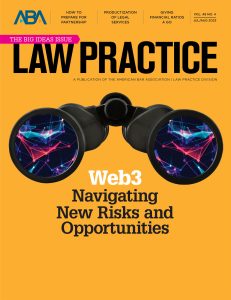 There seemed to be some irony in receiving the final, hard copy, mailed issue of Law Practice magazine in the same week that the U.S. Supreme Court effectively ended race-conscious admission programs at colleges and universities across the country. I won’t get overly political here except to say that I’m not a fan of SCOTUS these days, between these harmful rulings and ridiculously unethical behavior by appointed Justices that I would not welcome at my dinner table. It’s quite sad.
There seemed to be some irony in receiving the final, hard copy, mailed issue of Law Practice magazine in the same week that the U.S. Supreme Court effectively ended race-conscious admission programs at colleges and universities across the country. I won’t get overly political here except to say that I’m not a fan of SCOTUS these days, between these harmful rulings and ridiculously unethical behavior by appointed Justices that I would not welcome at my dinner table. It’s quite sad.
In Market Share Competition Among Diverse Law Firms Heats Up, and Gets Heated, my marketing column in the July/August 2023 issue of Law Practice, I address the state of doling out work to diverse lawyers and law firms—for the first time since my March/April 2017 column—a lot had changed. The first section of the recent column subtitled “Diversity in Reverse,” seemed so apropos after the SCOTUS decision. It already felt like progress that took decades to implement now saw courts turning back the clock. Again, quite sad.
Writing about competing for work in the diversity space was triggered by a joint report last year from the National Association of Minority and Women Owned Law Firms (NAMWOLF) and the Institute for Inclusion in the Legal Profession (IILP), “Understanding and Assessing the Use of Minority- and Women-Owned Law Firms by Corporate Clients.” Blend the George Floyd murder in with the COVID world of Zoom and Teams…and you get a picture of the modern landscape of the legal industry. There isn’t even a clear definition anymore of what diversity is, when contemplating the distribution of work.
 Marketing Attorney Blog
Marketing Attorney Blog



 In serving as an issue editor for the Marketing-themed March 2023 edition of the American Bar Association’s
In serving as an issue editor for the Marketing-themed March 2023 edition of the American Bar Association’s 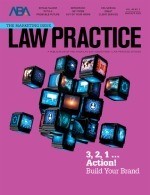 In my March/April 2023 marketing column in the American Bar Association’s Law Practice Magazine, I address the pros and cons of organizational involvement in
In my March/April 2023 marketing column in the American Bar Association’s Law Practice Magazine, I address the pros and cons of organizational involvement in 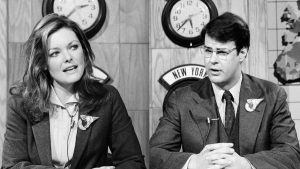
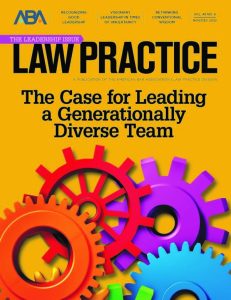
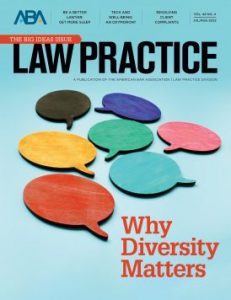 The last few years of recruiting and hiring marketing staff for law firms has certainly been interesting. On the plus side, law firms continue to invest in marketing and business development personnel. Some might argue that it is even more important as we come out of COVID and start to connect and reconnect with clients, prospective clients, and referral sources. The law firms that have
The last few years of recruiting and hiring marketing staff for law firms has certainly been interesting. On the plus side, law firms continue to invest in marketing and business development personnel. Some might argue that it is even more important as we come out of COVID and start to connect and reconnect with clients, prospective clients, and referral sources. The law firms that have 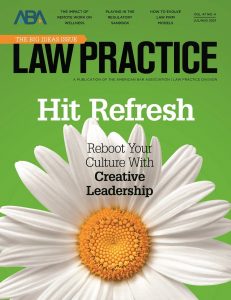 Yes, I went with the lowest hanging fruit of topics for my marketing column in the July/August 2021 issue of Law Practice,
Yes, I went with the lowest hanging fruit of topics for my marketing column in the July/August 2021 issue of Law Practice, 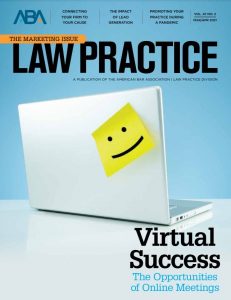 Earlier this week, I read an interesting article about how business travel will never fully return, because you can just go on Zoom, saving a ton of time and money. The story and premise all made sense until a quote at the end saying that the first time someone lost a sales pitch to a competitor that presented in-person—they’ll be right back on those airplanes. And I shook my head knowing that was so true.
Earlier this week, I read an interesting article about how business travel will never fully return, because you can just go on Zoom, saving a ton of time and money. The story and premise all made sense until a quote at the end saying that the first time someone lost a sales pitch to a competitor that presented in-person—they’ll be right back on those airplanes. And I shook my head knowing that was so true. This is the time of year where I sit down with my marketing committees to review what successes we had with our 2020 marketing plan and budget. The same for many one on one discussions with individual attorneys on his/her business development plans. Well, I’m not taking the blame for any failures this year—just say “COVID” and try again. So in this month’s issue of the ABA’s
This is the time of year where I sit down with my marketing committees to review what successes we had with our 2020 marketing plan and budget. The same for many one on one discussions with individual attorneys on his/her business development plans. Well, I’m not taking the blame for any failures this year—just say “COVID” and try again. So in this month’s issue of the ABA’s